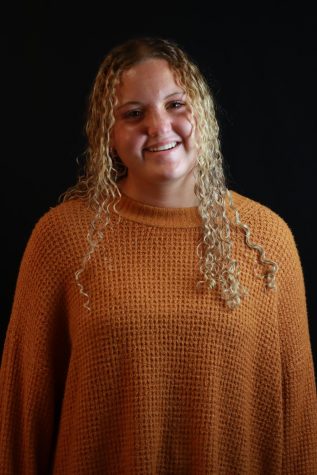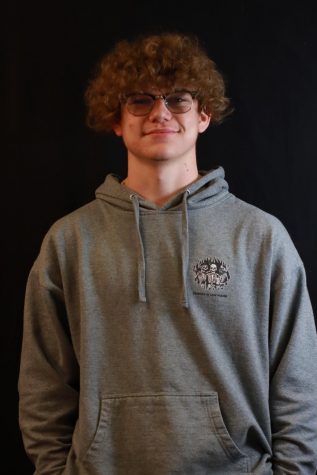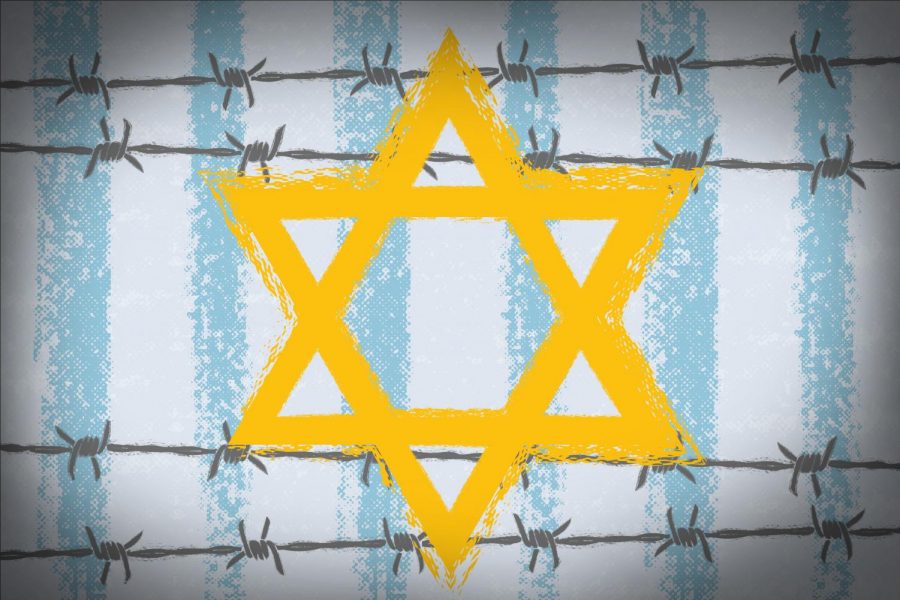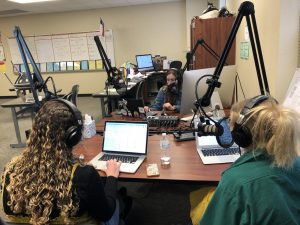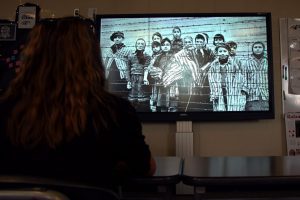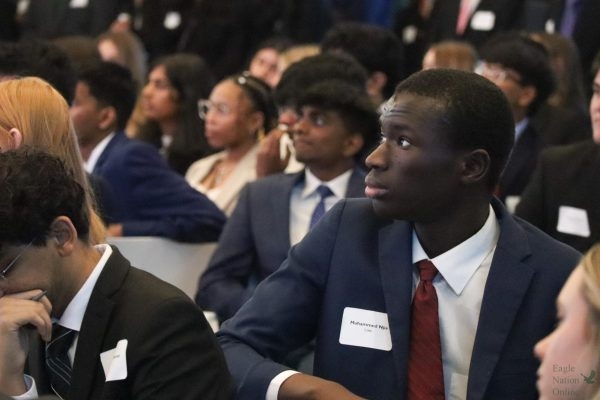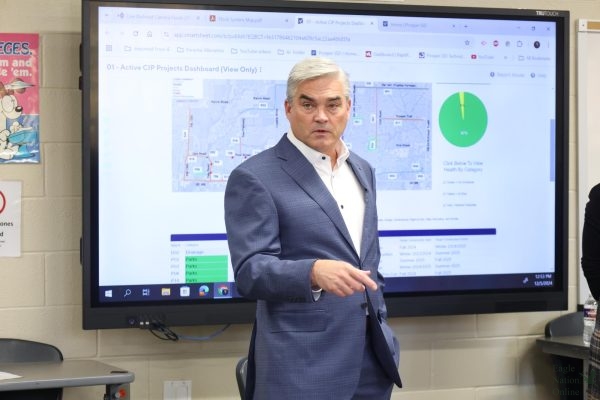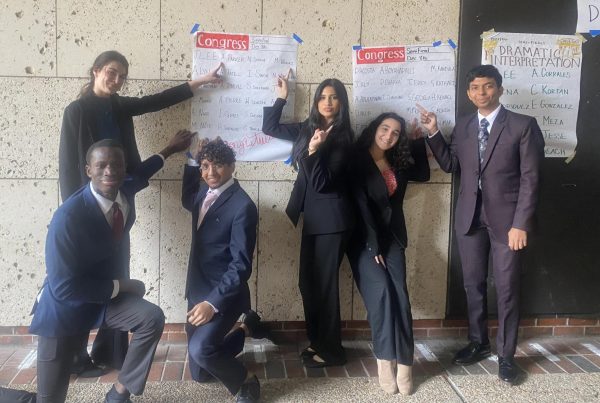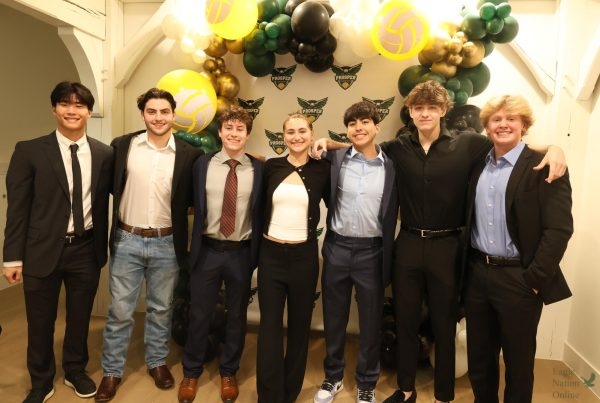District holds ‘Holocaust Remembrance Week’, provides special curriculum
“Holocaust Remembrance Week” will be held Jan. 25- 27. In this graphic design by senior Mark Chrissan, elements of this historical event set the scene for the attached news article by Caroline Wilburn on how the school district will be addressing this time period with curriculum designed for students to help them understand what happened. “I hope Holocaust remembrance week is taken as a motivation to us all,” senior and president of the Amnesty International club Erika Adjei said. “To always confront hatred and promote human dignity at all cost.”
Graphic photos, videos and evidence give students the realities of the Holocaust when classes study World War II, but often it feels like a scary movie instead of a real-life occurrence. This year, though, teachers here and throughout the district, will do even more to express society’s opinion that these events should never repeat.
“Holocaust Remembrance Week” will be held Jan. 25- 27. With a special curriculum designed for students, the district has a purpose to “educate students about the Holocaust and inspire in students a sense of responsibility to recognize and uphold the human value and to prevent future atrocities.”
“I can put on the TV or go to the movies and I can see all sorts of horrible, terrible things and it’s ok,” history teacher Jeffrey Kear said. “I’ve got my popcorn and my soda pop, and afterward we’re going to go do something else fun. It’s a story, and I’m safe here. I don’t think they feel the depth of the subject.”
This year, the district has designed a special curriculum for each grade with age-appropriate instruction, under direction by the Senate and Texas education code.
“I think the importance is to teach it in a way that is going to invoke empathy and teach tolerance, to students,” secondary social studies curriculum designer Andrea Hutchison said. “So, that we can prevent atrocities like the Holocaust from happening in the future. “
Hutchison is in charge of designing the curriculum, which she said will include history and lessons learned from the Holocaust, participation in learning projects and the use of materials developed or approved by the Texas Holocaust and Genocide Commission.
“A lot of people tend to stick to facts and statistics,” Hutchison said. “It’s really more about those discussions. Talking about how did this happen and what can we do to prevent things like this from happening again.”
Senior and president of the Amnesty International club Erika Adjei said the Holocaust is a reminder about the dangers of extremism and the need for the prevention of genocide today.
“Anti-semitism is still a prominent threat in American society,” Adjei said. “I think it’s important to stay vigilant and call on instances of hate as much as we can, and that’s definitely a lesson I want taught in school when we observe events like the Holocaust.”
Kear said one of the hardest things about teaching in a classroom is that showing pictures and videos doesn’t feel real enough for the students.
“I think you do have to keep educating people on it,” Kear said. “Why wouldn’t we do it again? That wasn’t even the first time we did it.”
Hutchison said she wants students to know that things like this did happen in the past.
“It’s ok to talk about it, and we need to talk about it,” Hutchison said. “It’s our responsibility and (student’s) responsibility, because they’re the future, to make sure things like this don’t happen again.”
In addition to covering topics in the classroom, teachers prefer to offer opportunities to learn via community resources.
“It used to be that we could take field trips,” Kear said. “We could take kids to a Holocaust museum, and survivors would be there. We could see the tattoos on their arms, and they could tell their personal stories. That was always a good thing because students could say, ‘What, like, it was real? You were there? It was real?’ There’s a kind of a-ha moment in that.”
According to Hutchison, even without trips or survivors, the district has made an effort to create a relevant curriculum to help students connect with the learning.
“It’s getting students to care about things that happened in the past when it seems like it doesn’t have any effect on them,” Hutchison said. “I think our teachers do a really great job in Prosper of connecting with students and making things relevant and teaching them how it’s relevant to their lives.”
Kear said helping students relate still poses a challenge.
“We don’t feel the imminent threat of something like that happening to us,” Kear said. “It’s just unimaginable. It’s just a scary story. That’s rough. We just do what we can do. We’ll show Schindler’s list. We’ll show the photographs of the camps being liberated. You can present first-person accounts, and there’s not a lot else you can do. It would be nice if there was something we could compare it to.”
Adjei said she believes students need to know more to understand the significance.
“The Holocaust occurred because of accumulation of complex factors of events,” Adjei said. “I think it’s important to remember that a lot of these atrocities, they don’t just have one solution of simple preventative tactic, but to combat instances of religious persecution. Amnesty (club) partners with international law agencies, united nations and international aid to help those who have been persecuted.”
Amnesty International, a non-governmental organization with the goal to fight abuses of human rights around the world, offers resources for the local group to use to help students be informed.
“There’s so many ways to observe this event,” Adjei said. “Students can reflect on the atrocities of the Holocaust at history educations centers like the Dallas Holocaust museum and sites like npr.com, and the history channel and history.com. They highlight the experiences and stories of Holocaust survivors.”
Founded in 2005, the Dallas Holocaust Museum offers Dallas/Fort Worth citizens a chance to see the real historical impact of the Holocaust. With testimonies from survivors and real historical evidence, the museum offers an interactive experience for all who attend.
“Teaching the history of the Holocaust is important because it is a paradigm of hatred, discrimination, prejudice and murder,” museum director of education Dr. Charlotte Decoster said. “We can use this historical paradigm to learn important lessons of human behavior, such as upstander behavior, to apply to our community and society today.”
Decoster said she wants people to learn that Holocaust history is human history.
“It impacts all of us and our society and community today,” Decoster said. “We can learn so many lessons from it from standing up against prejudice and our individual choices.”
Adjei indicates this isn’t just a job for adults, students should also make an effort to educate others.
“I hope “Holocaust Remembrance Week” is taken as a motivation to us all,” Adjei said. “To always confront hatred and promote human dignity at all cost.”
Besides teaching historical accuracy, Hutchison said she wants to share the emotional attachment to the event.
“Tolerance and empathy above everything,” Hutchison said. “Teaching and instilling those qualities in students above the facts and statistics, that is No. 1 priority. I also think, just people stories, telling the stories of people who didn’t get a chance to tell their own story.”
Editor’s note: This story was last updated Jan. 29 to include the video package by Eagle Nation News reporter Allison Wood on “Holocaust Remembrance Week.” Please see the “Related Stories” sidebar on the right above to view an editorial as well as hear a podcast that published as part of this series.
Your donation will support the student journalists of Prosper High School. Your contribution will allow us to purchase equipment and cover our annual website hosting costs.
